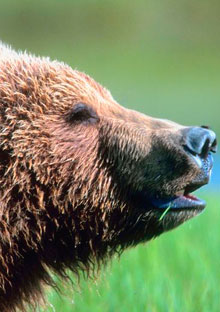Inside the Minds of Animals

Photo: © 2009 Jupiterimages Corporation
From playing practical jokes to manipulating currency to performing amazing acts of heroism, our planetmates are a funnier, shrewder, kindlier, more altruistic, and more empathetic bunch than most of us realize.
Thirty years ago, at a now defunct marine park in Palos Verdes, California, a baby orca took ill. The illness itself was nothing noteworthy, but what happened afterward had a profound impact on all who witnessed it. The staff had used a forklift and stretcher to hoist the 420-pound infant out of the main tank for emergency medical care. In a remarkable act of trust, the baby's parents, Orky and Corky, patiently watched the proceedings from the other side of the tank. The trouble began when the keepers tried to return the baby to the tank. The forklift operator, lacking a clear line of sight, halted the stretcher a few feet above the water, just beyond the grasp of the keepers who were waiting below. As the keepers struggled to reach and release the orca, it began throwing up—which, as trainer Gail Laule recalls, made for a desperate situation.
Orky, the father, then did something he'd never been trained to do. He swam beneath his baby, let a keeper stand on his head, and, using the awesome power of his flukes, held himself steady so the keeper could reach the latch on the stretcher and let the baby slip into the water. Not only did he seem to realize that the humans were trying to help; he appeared to understand that he could help them help.
In December 2005, a female humpback whale did Orky one better—by acknowledging the help. While swimming in the Pacific near San Francisco, the whale found herself entangled in a web of crab traps and lines. A team of divers assembled by Marin County's Marine Mammal Center spent an hour working to free the 50-ton animal. Like Orky, she seemed to realize that they were there to help. And when they succeeded, she swam around them, gently nudging each diver as though saying thank you.
After nearly 40 years of writing about wild animals, I'm still astonished by their "humanity." And sometimes I just have to laugh at their humanness. Wildlife researcher Charlie Russell and his partner, Maureen Enns, were working in the Russian Far East when a mother grizzly bear apparently decided she could trust them to look after her two cubs. Despite the fact that hundreds of grizzlies are killed by hunters and poachers in the area each year, the mother, named Brandy, deputized the humans for daycare duty while she did her foraging. And like many a human parent who's confessed to sneaking away in order to avoid a scene, Brandy cleverly waited until the cubs were distracted before making a quick exit.
These anecdotes are just stories, of course; they're not scientific in the way that strictly controlled studies are. I've come to realize, though, that credible stories can tell us what animals are like in ways that strictly controlled studies cannot. I spent years writing about animal intelligence before it dawned on me that I might convey a fuller picture of the animal mind and—yes—soul by complementing studies with insights I'd collected from hundreds of scientists, zookeepers, and field observers. These days, after years of frustrating attempts to test elusive abilities such as intelligence or language, even behavioral scientists are more willing to consider observation and anecdote as guides.
Photo: Courtesy of the Animal Legal Defense Fund



